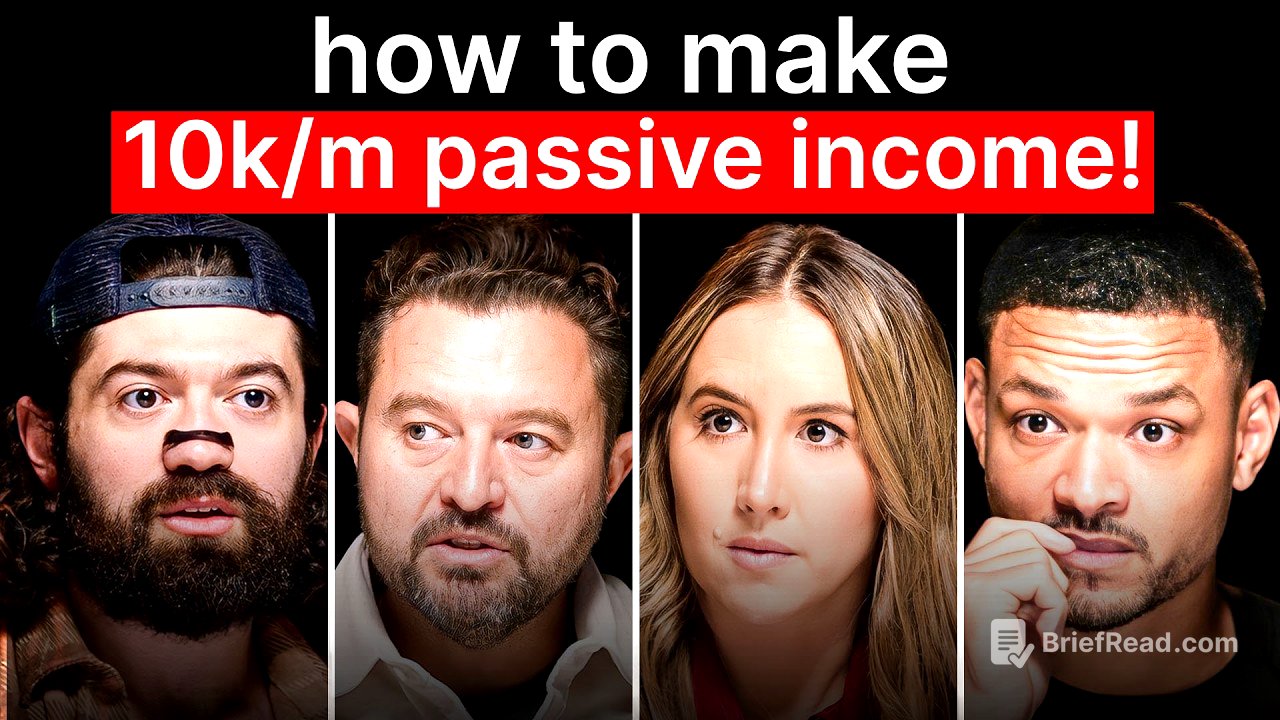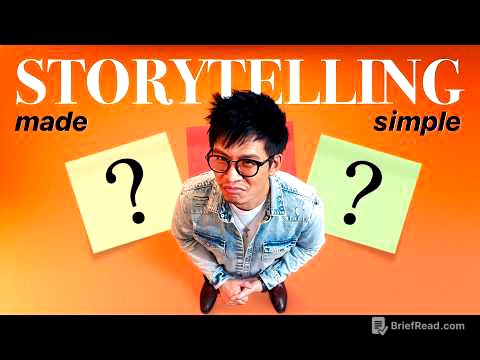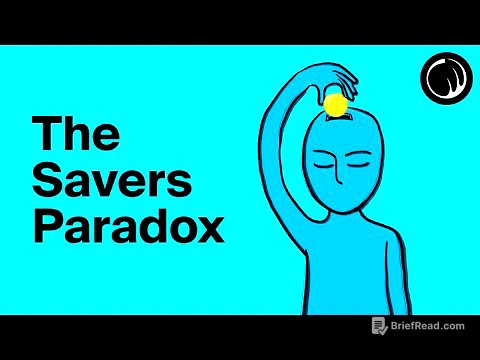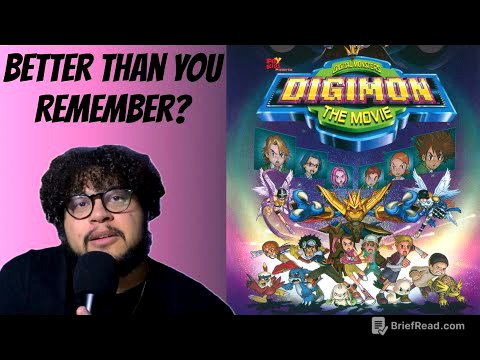TLDR;
This YouTube video features a master class in entrepreneurship with three successful entrepreneurs: Alex Hormozi, Cody Sanchez, and Daniel Priestley. They discuss strategies for creating and scaling businesses, including stress-testing ideas, pricing, sales, passive income, content creation, and investment. Key takeaways include the importance of selling to high-value clients, building a strong brand, understanding financial engineering, and prioritizing depth over breadth in content creation.
- Importance of MOAT strategy: Margin, Operations, Advantage, Total Addressable Market
- Focus on selling to high-value clients for better returns.
- Content creation is valuable for building a brand and influence.
- Financial engineering and understanding money games are crucial for wealth creation.
Intro [0:00]
The host introduces three successful entrepreneurs, Daniel Priestley, Cody Sanchez, and Alex Hormozi, as the "Avengers of entrepreneurship." They will share their insights and frameworks on creating and scaling businesses to make millions. The discussion promises to cover various aspects of entrepreneurship, from validating business ideas to building a content empire.
How to Stress Test Your Business Idea [2:29]
Daniel introduces the MOAT strategy used in private equity to evaluate business ideas. MOAT stands for Margin (aim for at least 15% net margin), Operations (scalability of the business), Advantage (unfair advantage such as distribution or experience), and Total Addressable Market (sufficient market size). Each factor is ranked from 1 to 10, and a total score above 30 indicates a fundable business model. Alex emphasizes that not everyone needs to pursue billion-dollar ventures, and a smaller, local business can be perfect for some individuals. Cody suggests that every business should be reevaluated due to the disruption caused by AI, and entrepreneurs should leverage their case studies, knowledge, networks, and resources. She also looks for ideas that address someone's pain, target people with money to spend, and align with the entrepreneur's passion.
Selling to the Rich: Are Your Prices Too Low? [10:47]
Alex discusses the importance of selling to those who yield the most returns from your skills, using the example of working with larger companies for conversion rate optimization. He highlights that the value created is significantly higher, allowing for better negotiation of prices. He also shares a story about an occupational health and safety consultant who increased his day rate tenfold by focusing on high-risk workplaces. Cody emphasizes that selling to the rich allows for selling at rich people prices. She shares a story about a home inspection company that increased its margins by 45% simply by adding "luxury" to its name and targeting wealthier clients.
How Pricing Can Save Your Business [16:01]
Alex suggests that businesses are often underpriced because entrepreneurs fear rejection. He provides a benchmark: appropriate pricing occurs when about 7 out of 10 people say no. Cody shares her experience of tripling her gym's prices, which led to a doubling of revenue and a reduction in costs. Alex adds that raising prices can significantly increase profits, especially for businesses with low margins. He advises entrepreneurs to add a zero to their price and act the same. He also introduces the concept of value metrics, where prices should reflect usage, number of users, and the value derived by the customer.
How to Be Confident with Your Prices and Value [22:20]
Alex explains that confidence in pricing comes from experience and realizing that you can't charge too little for your services. He suggests outworking yourself to the point where you become bored with the activity, which builds confidence. Daniel identifies two types of confidence: one from repetition and the other from having an abundance of options. Alex believes that people today do less but think they do more, leading to "mental masturbation" rather than actual execution. He advises focusing on preparation and obsession over a few key opportunities rather than spreading efforts too thin.
Closing Deals and Communicating with High-Status Individuals [27:40]
Daniel introduces a framework for effective communication, emphasizing the resonance of the message and the signalness of the medium. He suggests using less noisy channels like physical mail to stand out. Cody advises being cautious when reaching out to people with millions of followers and instead targeting those with smaller but successful businesses. She recommends using a "proof story" format: "I did something special with a certain type of person, we got a great result, here's what the result was, and here's how I can explain it step by step." Alex emphasizes the importance of focusing on rich individuals rather than famous ones, as they are more likely to provide financial opportunities.
How to Make Passive Income [35:17]
Alex defines passive income as a continuum rather than a binary concept and suggests that it's not a priority for those starting out. He believes that focusing on increasing active income yields higher returns. He shares an example of investing in content creation, which initially had zero return but eventually became a high-return investment. He advises focusing on getting more leverage on active income through skills or equipment. Daniel prefers the idea of asset income, where an asset generates income. He distinguishes between traditional assets (art, wine, watches) and performance assets (intellectual property, media, code, data). Cody presents a conspiracy theory that the idealization of passive income benefits the wealthy class by encouraging people to invest in their assets rather than building their own businesses.
Stacking Skills and Multiplying Your Income [43:02]
Alex shares his strategy for starting from zero, which involves learning how to advertise and selling leads to existing businesses. He emphasizes the importance of acquiring skills that generate money, such as promotion through content, paid ads, or affiliate marketing. Daniel believes in stacking skills and leveraging them to increase income. He suggests that the fastest way to make $100,000 is not the fastest way to make $10 million, and it's important to adapt your approach as you accumulate capital. Cody highlights the importance of finding your unfair advantage, whether it's promotion or partnerships. She suggests that those who are not natural salespeople should focus on finding the best entrepreneur to work for and learn from.
Is Producing Content Undervalued? [52:01]
Daniel suggests that content works best when you have intellectual property to leverage. He notes that creators need a hook to stand out from the increasing amount of AI-generated content. Alex believes that content creators need to decide whether they are entertainers or educators. He suggests that the foolproof method for making educational content is to "do epic [stuff] and then talk about the epic [stuff] you did." Cody emphasizes that the bigger the proof, the wider the total addressable market you can reach.
Going Viral Online and Monetizing It [57:12]
Daniel believes that anyone can go viral online with experience or the everyday act of trying something new. Alex points out that expertise leads to attention and intent to buy, while experience may only generate attention. He uses Rihanna and Drake as examples to illustrate the importance of converting attention into intent to buy. Cody suggests that those with a backend business should work with someone who can project manage their content creation.
Ads [1:01:33]
This chapter is skipped as it is an advertisement.
Secrets About Content Creation [1:02:30]
Alex shares that when he started making content, many people thought it was cringe, but he believes that attention is the 21st-century currency. He advises being prepared for criticism and embarrassment when getting online. Cody emphasizes that social media is shifting towards interest media rather than social media. Alex introduces the SPCL framework for creating influence: Status, Power, Credibility, and Likeness. He explains that educators typically have smaller but more engaged audiences, while entertainers rely on sponsorships.
How to Create Influence [1:05:27]
Alex continues discussing the SPCL framework, explaining that status comes from controlling scarce resources, power comes from giving instructions that lead to positive outcomes, credibility comes from proof, and likeness comes from sharing values with the audience. He emphasizes that content should be explicitly for a specific audience and demonstrate proof. Cody adds that it's important to align with your audience's values and take a stance that could potentially hurt your business. Daniel believes that you never sell anyone anything; you only find those who are already predisposed to want what you are selling.
Why the Depth of Your Message Matters More Than the Numbers [1:14:42]
Daniel believes that content should align with a mission and build relationships at scale. He suggests that the big play in a post-AI world is having deep relationships with a lot of people using long-form content. Alex wonders if rawness is more important than depth in an era where AI can reproduce anything. He suggests that streams are interesting because they are raw and authentic. He also shares the marketing affinity loop: awareness, consideration, purchase, advocacy, and loyalty.
The Best Framework to Pitch Ideas [1:25:58]
Daniel emphasizes that entrepreneurship is the journey of a thousand pitches and that you get what you pitch for. He introduces the NAME, SAME, FAME, PAIN, AIM, GAME framework for social pitches and the CAPSTONE framework (Clarity, Authority, Problem, Solution, Traction, Opportunity, Next Steps, Emotional Ending) for scheduled pitches. Alex shares the MIGHTIEST TOUCH framework for raising money: Profit, Growth, History, and Story. He emphasizes that proof will always beat promise. He also introduces the CLOSER framework for closing sales: Clarify, Label, Overview, Sell, Explain, Reinforce.
Ads [1:36:07]
This chapter is skipped as it is an advertisement.
The Importance of Body Language in Sales and Pitches [1:38:24]
Alex discusses the importance of controlling your voice in sales, including speed, cadence, annunciation, volume, pauses, and emphasis. He emphasizes that speaking less and knowing when to shut up are crucial for closing sales. Daniel believes that it's important to present yourself as a key person of influence. He shares a story about a financial planner who increased her day rate by changing her pitch and body language.
Harvard Study Reveals What Makes Women Sell More [1:46:06]
Cody shares that studies show women make more money if they wear makeup. She also notes that dressing professionally can increase earnings for both men and women. Alex emphasizes the importance of showing rather than telling and using visuals to increase conversions. He also recommends pitching the assessment to potential clients.
How to Invest Your Money to Build a Business [1:55:23]
The hosts are given a hypothetical scenario where they have $1,000, $10,000, or $100,000 to start a scalable business. Alex, with $1,000, would invest in AI integration knowledge and offer email list activation services to small businesses on a percentage basis. Cody, with $10,000, would target private equity companies and offer deal sourcing services. Daniel, with $100,000, would invest in a business with Cody, leveraging her knowledge, network, and reputation.
What Most Entrepreneurs Don’t Know [2:06:39]
Alex believes that brand and distribution are wildly undervalued. Cody emphasizes the importance of financial engineering and understanding how to use other people's money. Daniel believes that the whole game relates to constrained supply and excess demand. The hosts conclude by emphasizing the importance of hiring exceptional people and creating a strong culture.









